Ditapis dengan
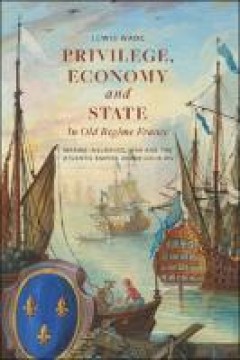
E-Book Privilege, Economy and State in Old Regime France: Marine Insurance, W…
This book closely analyses the rise and fall of Louis XIV's marine insurance institutions in Paris, which were central to the French monarchy's efforts to stimulate commerce, colonial enterprise and economic growth. These institutions were the projects of two leading ministers, Jean-Baptiste Colbert and his son, the Marquis de Seignelay. While both men recognised that marine insurance was cruci…
- Edisi
- -
- ISBN/ISSN
- 9781800108813
- Deskripsi Fisik
- 378 halaman
- Judul Seri
- -
- No. Panggil
- 944 WAD p
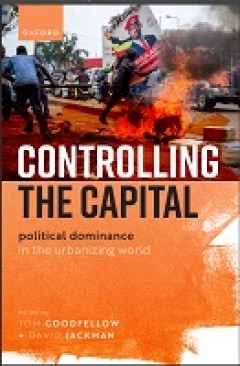
E-Book Controlling the Capital: Political Dominance in the Urbanizing World
- Edisi
- -
- ISBN/ISSN
- 9780192868329
- Deskripsi Fisik
- 289 halaman
- Judul Seri
- -
- No. Panggil
- 330.91 GOO c
- Edisi
- -
- ISBN/ISSN
- 9780192868329
- Deskripsi Fisik
- 289 halaman
- Judul Seri
- -
- No. Panggil
- 330.91 GOO c
E-book Transformative pathways to sustainability : Learning across discipline…
This book tries to address these questions. The research detailed in this volume (which took place pre-Covid-19) engages with the specificities of dif-ferent contexts around the world, while seeking general lessons that can be drawn about transformations to sustainability and the role of research within them. It thus documents a new approach (or approaches) that…
- Edisi
- -
- ISBN/ISSN
- 9780429331930
- Deskripsi Fisik
- 267 hlm
- Judul Seri
- -
- No. Panggil
- 338.9 ABR t
E-book The Global Fund Strategy 2017 - 2022
The Global Fund was designed to evolve to best meet the needs of a changing world context. More than 50 percent of the burden of each of the three diseases and the majority of the world’s poor now live in countries classified by the World Bank as middle income but still varying greatly in terms of quality, access, and capacity of health service provision. Simultaneously, concentrations of dis…
- Edisi
- -
- ISBN/ISSN
- -
- Deskripsi Fisik
- 40 hlm
- Judul Seri
- -
- No. Panggil
- 338.91 THE t
E-book Spationomy : Spatial Exploration of Economic Data and Methods of Inter…
The project aims to exchange interdisciplinary knowledge in the fields of economics and geomatics. For the newly introduced courses, interdisciplinary learning materials have been developed by a team of lecturers from four different universities in three countries. In a first study block, students were taught methods from the two main research fields. Afterwards, the knowledge gained had to be …
- Edisi
- -
- ISBN/ISSN
- 9783030266264
- Deskripsi Fisik
- 320 hlm
- Judul Seri
- -
- No. Panggil
- 330.9 PAS s
E-book NATO 2030 : United for a New Era
NATO enters the eighth decade of its existence with both a longer record of success and a wider assortment of looming challenges than its founders could have foreseen when they signed the Washington Treaty in April 1949. In the thirty years since the collapse of the Soviet threat that called NATO into existence, the Western Alliance has defied innumerable predictions of its imminent demise. It …
- Edisi
- -
- ISBN/ISSN
- -
- Deskripsi Fisik
- 67 hlm
- Judul Seri
- -
- No. Panggil
- 338.91 NAT n
E-book Sweden and the 2030 Agenda
The Swedish Government also views the 2030 Agenda as a dynamic framework that opens up new global opportunities for all societies and stakeholders, both nationally and internationally. It is an agenda for a common and long-term sustainable environmental, social and economic development, linked to fighting poverty and hunger and inequality within and between countries, in order to build peaceful…
- Edisi
- -
- ISBN/ISSN
- -
- Deskripsi Fisik
- 88 hlm
- Judul Seri
- -
- No. Panggil
- 338.9486 SUS s
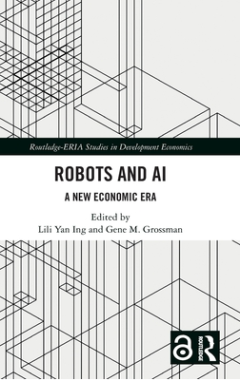
E-book Robots and AI
Robots and artificial intelligence (AI) are powerful forces that will likely have large impacts on the size, direction, and composition of international trade flows. This book discusses how industrial robots, automation, and AI affect international growth, trade, productivity, employment, wages, and welfare. The book explains new approaches on how robots and artificial intelligence affect the w…
- Edisi
- -
- ISBN/ISSN
- 9781003275534
- Deskripsi Fisik
- -
- Judul Seri
- -
- No. Panggil
- 629 ING r
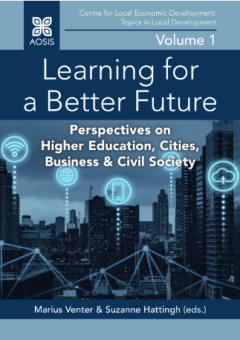
E-book Learning for a Better Future
Various international scholars and associates of the PASCAL (Place, Social Capital and Learning Regions) International Observatory (Africa hub), under the auspices of the Centre for Local Economic Development (CENLED) based at the University of Johannesburg (UJ), have contributed chapters in this scholarly book. The book aims to demonstrate how a combination of globalisation, pandemics and the …
- Edisi
- -
- ISBN/ISSN
- 9781928523994
- Deskripsi Fisik
- Iv, 287hlm.; ill
- Judul Seri
- Perspectives on Higher Education, Cities, Business & Civil Society
- No. Panggil
- 338.90091724 VEN l
E-book The Century of Global Cities : How Urbanisation is Changing the World …
Think tanks and research centres worldwide are devoting in-creasing attention to the growing role of global cities. Why do global cities matter? And why should a think tank dealing with international affairs such as ISPI look at the evolving role of global cities? The obvious answer is: because cities do matter. Urban settings cover barely 2% of the Earth’s surfac…
- Edisi
- -
- ISBN/ISSN
- 9788855260916
- Deskripsi Fisik
- 151 hlm
- Judul Seri
- -
- No. Panggil
- 338.9 IWA t
E-book Mineral Building Traditions in the Himalayas
The use of mineral based building material in the Himalayas has a long tradition, probably reach-ing back to the first settlements. Use of such material was, and partially still is, deeply anchored as an essential material cultural fingerprint and certainly a manifestation of cultural identity. Mineral building tradition influenced the evolution of certain structural features which were insepar…
- Edisi
- -
- ISBN/ISSN
- 9783110591330
- Deskripsi Fisik
- 397 hlm
- Judul Seri
- -
- No. Panggil
- 553.6 FEI m
E-book Mapping Good Work : The Quality of Working Life Across the Occupationa…
High-quality work is central for a productive and thriving society. Ensuring a sufficient quality of work – as a policy issue – as opposed the government’s conventional responsibility of ensuring a sufficient quantity of work – reached its zenith in the UK in July 2017 when the government published a review to scope out a new national job quality strategy. The public…
- Edisi
- -
- ISBN/ISSN
- 9781529216097
- Deskripsi Fisik
- 164 hlm
- Judul Seri
- -
- No. Panggil
- 306.3 WIL m
E-book Resurgent Asia : Diversity in Development
esurgent Asia analyses the phenomenal transformation of Asia, which would have been difficult to imagine, let alone predict, fifty years ago, when Gunnar Myrdal published Asian Drama. In doing so, it provides an analytical narrative of this remarkable story of economic development, situated in its wider context of historical, political, and social factors, and an economic analysis of the underl…
- Edisi
- -
- ISBN/ISSN
- 9780198849513
- Deskripsi Fisik
- 316 hlm
- Judul Seri
- -
- No. Panggil
- 338.95 NAY r
E-book The Least Developed Countries in the Post-Covid World : Learning from …
This year marks 50 years since the least developed countries (LDCs) category was established by a United Nations General Assembly resolution, following research, analysis and advocacy work by the United Nations Conference on Trade and Development (UNCTAD). This pivotal landmark comes as intergovernmental negotiations are taking shape for a new programme of action for the LDCs for the decade 202…
- Edisi
- -
- ISBN/ISSN
- 9789210056052
- Deskripsi Fisik
- 180 hlm
- Judul Seri
- -
- No. Panggil
- 338.9 TRA t
E-book Resilient Bangkok
Bangkok supports over 8 million people in the city, and over 14 million in its metropolitan area, who travel to and from work, access healthcare, and partake in entertainment and recreation. To ensure that our residents can experience an increased quality of life, we will work to improve social services and mobility for all residents. Ensuring our healthcare and facilities meet the evolving ne…
- Edisi
- -
- ISBN/ISSN
- -
- Deskripsi Fisik
- 128 hlm
- Judul Seri
- -
- No. Panggil
- 338.91 TEA r
E-book China 2030 : Building A Modern, Harmonious, and Creative Society
China’s economic performance over the past 30 years has been remarkable. It is a unique development success story, providing valuable lessons for other countries seeking to emulate this success—lessons about the importance of adapting to local initiative and interregional competition; integrating with the world; adjusting to new technologies; building world-class infrastructure; and investi…
- Edisi
- -
- ISBN/ISSN
- -
- Deskripsi Fisik
- 473 hlm
- Judul Seri
- -
- No. Panggil
- 338.951 THE c
E-book Connecting South Asia and Southeast Asia
The success story of economic growth in Southeast Asia over the past few decades is well known. It resulted from an outward-looking strategy of export-oriented growth, coupled with openness to foreign direct investment by more developed economies both within Asia and outside, generally market-friendly policies, and extensive investment in infrastructure. It led to deep economic integration of S…
- Edisi
- -
- ISBN/ISSN
- 978-4-89974-048-3
- Deskripsi Fisik
- 320 hlm
- Judul Seri
- -
- No. Panggil
- 338.9 ASI c

Be Thrifty : How to live better with less.
- Edisi
- -
- ISBN/ISSN
- 9780761156093
- Deskripsi Fisik
- 372 hlm. 15 cm x 20 cm
- Judul Seri
- -
- No. Panggil
- 640.7 CAT b
- Edisi
- -
- ISBN/ISSN
- 9780761156093
- Deskripsi Fisik
- 372 hlm. 15 cm x 20 cm
- Judul Seri
- -
- No. Panggil
- 640.7 CAT b
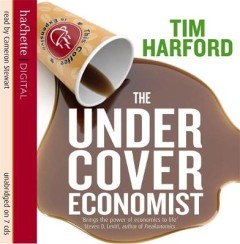
The Undercover economist
The economics of everyday life in everyday terms, brought to life by a young and very talented economist.
- Edisi
- -
- ISBN/ISSN
- 978034911985
- Deskripsi Fisik
- 278 hlm; 12,5 cm x 19,5 cm.
- Judul Seri
- -
- No. Panggil
- 330.9 HAR t
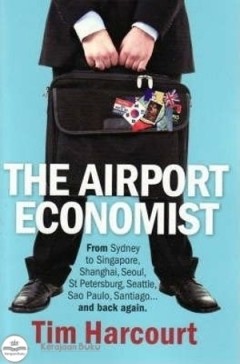
The Airport Economist
- Edisi
- -
- ISBN/ISSN
- 9781741755121
- Deskripsi Fisik
- ix+194 hlm; 13 cm x 19,5 cm
- Judul Seri
- -
- No. Panggil
- 382 HAR t
- Edisi
- -
- ISBN/ISSN
- 9781741755121
- Deskripsi Fisik
- ix+194 hlm; 13 cm x 19,5 cm
- Judul Seri
- -
- No. Panggil
- 382 HAR t
 Karya Umum
Karya Umum  Filsafat
Filsafat  Agama
Agama  Ilmu-ilmu Sosial
Ilmu-ilmu Sosial  Bahasa
Bahasa  Ilmu-ilmu Murni
Ilmu-ilmu Murni  Ilmu-ilmu Terapan
Ilmu-ilmu Terapan  Kesenian, Hiburan, dan Olahraga
Kesenian, Hiburan, dan Olahraga  Kesusastraan
Kesusastraan  Geografi dan Sejarah
Geografi dan Sejarah